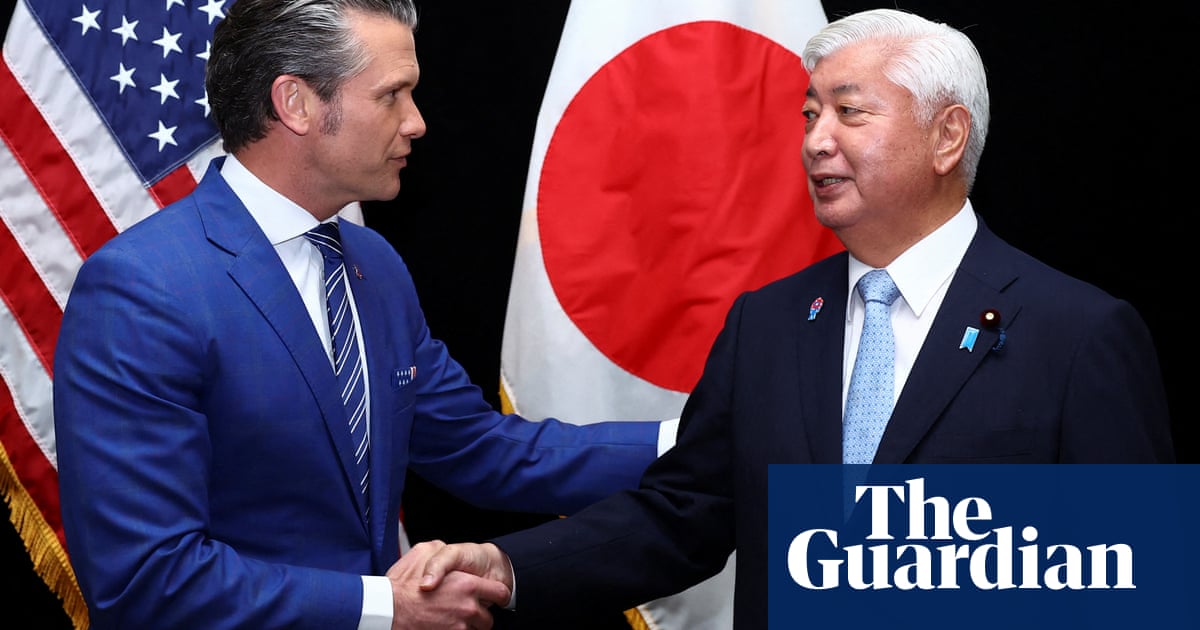Pete Hegseth has called on Asian countries to increase their military spending to increase regional deterrence against China which was “rehearsing for the real deal” of taking overTaiwan.
The US defense secretary, addressing the Shangri-la Dialogue in Singapore on Saturday, reiterated pledges to increase the US presence in the Indo-Pacific and outlined a range of new joint projects.
“It has to be clear to all that Beijing is credibly preparing to potentially use military force to alter the balance of power in the Indo-Pacific,” Hegseth said. “There’s no reason to sugar coat it. The threat China poses is real, and it could be imminent.”
Hesgeth said Donald Trump’s administration hadpushed European countries to boost their defensive spending, taking on a greater “burden” of responding to conflicts in their region, and it was time for Asian nations to do the same.
The defense secretary, who in March was revealed to have tolda Signal group chat that Europe was “pathetic” and “freeloading”on US security support in the region, told the Singapore conference it was “hard to believe” he was now saying this but Asian countries should “look to allies in Europe as a newfound example”.
“Deterrence doesn’t come on the cheap … time is of the essence.”
Read the full story
If you want a bellwether to measure the broad impact ofDonald Trump’stariffson the economy, look to the state ofGeorgia.
So far, it’s a mixed bag. The hospitality industry is facing an existential crisis and wine merchants wonder if they will survive the year. But others, like those in industrial manufacturing, carefully argue that well-positioned businesses will profit.
Read the full story
Australia’s trade minister, Don Farrell, has described Donald Trump’strade tariffsas “unjustified and not the act of a friend” after the US president announced he would doubleimport duties on steel and aluminiumto 50%.
“They are an act of economic self-harm that will only hurt consumers and businesses who rely on free and fair trade,” Farrell said.
Read the full story
US immigrationauthorities are collecting and uploading the DNA information of migrants, including children, to a national criminal database, according to government documents released earlier this month.
The database includes the DNA of people who were either arrested or convicted of a crime, which law enforcement uses when seeking a match for DNA collected at a crime scene. But most of the people whose DNA has been collected by Customs and Border Patrol (CBP), the agency that published the documents, were not listed as having been accused of any felonies.
Read the full story
Workers at the US Department ofEnergysay cuts and deregulations are undermining the ability for the department to function and will result in significant energy cost hikes for consumers.
Donald Trump’s “big, beautiful bill” will raise energy costs for American households by as much as 7% in 2035 due to the repeal of energy tax credits and could put significant investment and energy innovation at risk, according to areportby the Rhodium Group.
Read the full story
As the firstPridemonth underDonald Trump’s second presidency approaches,LGBTQ+businesses are stepping up, evolving quickly to meet the community’s growing concerns.
The Guardian spoke with four queer business owners, and one message was clear: queer businesses are here to support the community now more than ever and spread joy as resistance.
Read the full story
Tensions amongBruce Springsteen’s fanbase have spread to his home state of New Jersey because of what the rock icon has said about Donald Trump.
Springsteen has long been a balladeer of the state’s blue-collar workers. But last year many of those same workers voted for the president. Now their split loyalties are being put to the test.
Read the full story
An undocumented man who was accused by the Department of Homeland Security secretary last week of threatening to assassinate Donald Trumpmay have been framedby someone accused of previously attacking the man, according to news reports.
As the Trump administration continues to exploit antisemitism to arrest protesters and curb academic freedoms, more American Jews aresaying “not in my name”.
Catching up?Here’s what happened on30 May 2025.
